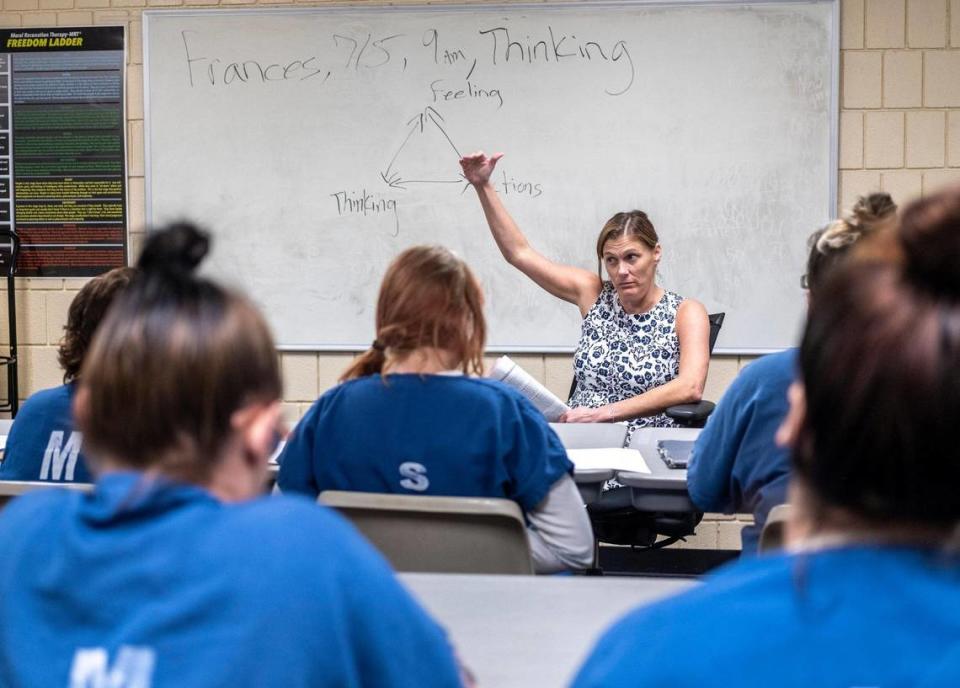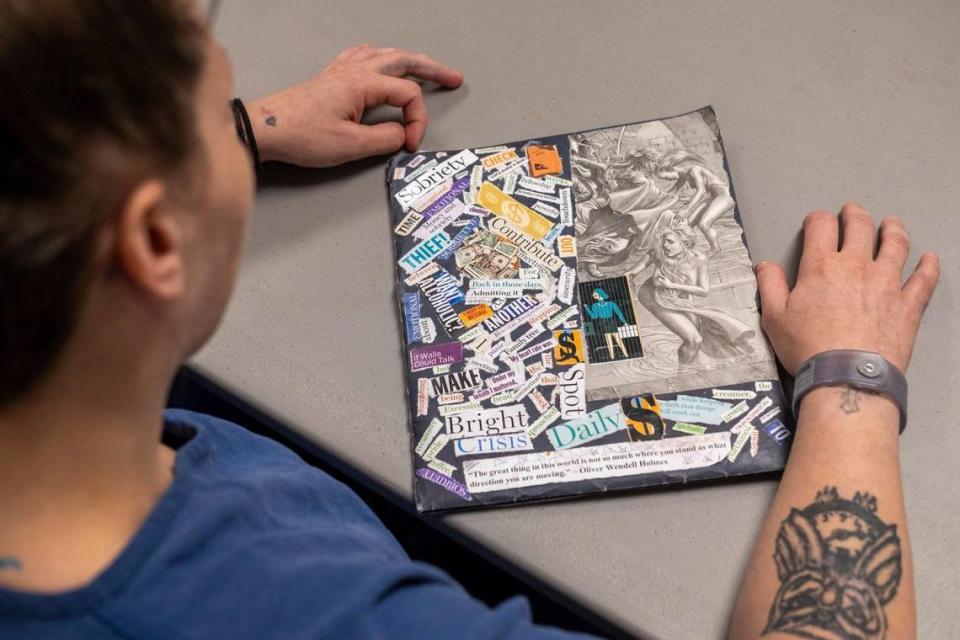‘Next Steps’ addiction recovery program finally introduced to female inmates at Horry jail
“Thinking.” “Feeling.” “Actions.” The words are written on a white board in a classroom at J. Reuben Long Detention Center Wednesday morning.
A small group of women are gathered there, laughing, and listening to a teacher at the head of the room.
All of them are inmates, and all of them are in different stages of addiction recovery.
The lesson on this day is on “changing your way of thinking.” For Frances Tufts, one of the addiction counselors who leads the new “Next Steps” program for women at J. Reuben Long, this is a lesson she frequently tries to hit home.
Some of the women in the classroom had never been clean before, according to Tufts. One participant spoke up during the class and said she had been previously clean for two years.

For the past 15 years, the “Next Steps” addiction recovery class has only been available to male inmates after sentencing as part of a jail diversion program.
Jail officials have wanted to bring the same resources to female inmates for a long time, but couldn’t due to staffing issues and funding. Grant funding approved in December ultimately allowed the jail to introduce the “Next Steps” program to pretrial female inmates.
Such programs have become important as the population of female inmates continues to grow nationally.
Between 1980 and 2021, the number of incarcerated women increased by more than 525% in the U.S., rising from a total of 26,326 in 1980 to 168,449 in 2021, according to a report put out by The Sentencing Project.
The number of female inmates has grown slightly over the years at J. Reuben Long Detention Center in Conway.
The average population of female inmates compared to men is about 100 to 600, according to Dustin Walters, the program director at J Reuben Long Detention Center. .
Addiction affects majority of county’s inmates
Grant funding to hire three new certified peer-support specialists was approved by the county in December, and the “Next Steps” program was introduced to pretrial female inmates in January, according to Walters.
The pretrial program will eventually be brought to male inmates as well. A pretrial program is for inmates who are awaiting trial and proof of participation can be brought before a judge, which could allow for possible sentencing reduction.
Addiction affects the majority of inmates, Walters said. Cases with opioid use are the most common.
“National research shows about 60% of incarcerated people are impacted by addiction,” Walters said. “We estimate that it’s much higher in our facility, probably closer to 80%.”
Walters said he remembered the first female inmate accepted into the program broke down in tears when she found out.
“She felt like this was the only opportunity that she had ever been able to take hold of, you know, and the only opportunity she was able to take when she needed it the most,” Walters said. “It was really powerful.”
Recovery for women is different than men
Tufts, who had long advocated for such programs at the jail, said she was surprised — and impressed — to see the same resources brought to women.
“All the research is on men,” Tufts said. “We are a male-centered society to begin with, but the correctional research is on men. The addiction research is on men. Dustin (Walters) found curriculum written for women, which is difficult.”
Over a year was spent on researching best practices for addiction treatment centered on women. Walters and Tufts had the opportunity to learn in Minnesota from one of the nation’s only sources of information.
Because the program is pretrial, many women are at different stages of recovery and the time they have in class varies on when they get out of jail, according to Tufts.
Participants are able to bring documentation of class participation to their court date, which could result in a lesser sentence.
But women need different curriculum than men when it comes to addiction recovery. The treatment has to be trauma-responsive as well as trauma-informed, Tufts said.
Around 85% of women in correctional facilities would qualify for a PTSD diagnosis, she said.
“You open yourself up for that when you add addiction in too,” Tufts said. “It’s just more likely to happen. Especially being in a jail not knowing what’s going on, not having control of shutting your door or opening your door, who’s around you, any of that, just keeps the trauma going. So trauma-responsive is really really important for women.”
During the class, women are given a binder to hold all their class materials.
Without access to tape or glue, some inmates have taken to decorating their class binders with magazine clippings and collages using toothpaste.

Measuring success is difficult right now
The program for the women is still very new, so measuring success is hard.
But Walters said the men’s next step program has been successful. The recidivism rate — the tendency of someone convicted to re-offend — is around 10% out of all participants. That’s out of about 500 inmates who have gone through the jail diversion program since its inception, according to Walters. And the number is reflects program participants who return to J. Reuben Long within one year of release.
But it can take someone multiple times in an addiction recovery program before they become successful, Tufts said. Walters and Tufts both said they don’t fixate on the outcome.
“Because that’s the nature of the disease,” Walters said of addiction. “You know, it’s a chronic, progressive relapsing disease.”
And it takes the support of the entire staff, not just the counselors or supervisors, to have the success. Tufts said she was very grateful for the officers at J. Reuben Long.
“I think we like the officers a lot here,” Tufts said. “They are the most supportive in the world, but they are already doing that job. So to expand is amazing.”

